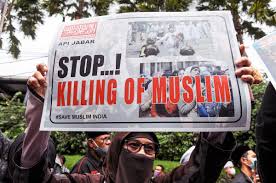The Promotion of Hate Against Islam and Muslims by the Indian BJP Government: An Analysis
Introduction
In recent years, there has been increasing concern over the policies and rhetoric of the Bharatiya Janata Party (BJP) government in India, which many argue promotes hatred against Islam and Muslims. This article explores the reasons behind this phenomenon, examining historical, political, and social factors. It aims to provide a nuanced understanding of the dynamics at play, shedding light on the implications for India’s secular fabric and social harmony.
Historical Context
- Partition of India:
- The partition of India in 1947, which led to the creation of Pakistan, left deep scars and fostered lasting animosities between Hindu and Muslim communities. The BJP and its ideological parent, the Rashtriya Swayamsevak Sangh (RSS), often draw on these historical grievances to consolidate support among Hindu voters.
- Rise of Hindutva Ideology:
- The BJP is closely aligned with the Hindutva ideology, which seeks to establish the hegemony of Hindus in India. This ideology was articulated by figures like Vinayak Damodar Savarkar and K.B. Hedgewar, who advocated for a Hindu-centric nation.
Political Strategies
- Vote Bank Politics:
- The BJP’s electoral strategy often involves mobilizing Hindu voters by portraying Muslims as a threat to national identity and security. This tactic, known as “communal polarization,” helps the party consolidate its core voter base.
- Scapegoating for Political Gains:
- By scapegoating Muslims, the BJP diverts attention from pressing issues such as economic challenges, unemployment, and corruption. This diversionary tactic allows the party to evade accountability for governance failures.
- Legislative Actions:
- The BJP government has enacted and supported several controversial laws and policies that disproportionately affect Muslims, such as the Citizenship Amendment Act (CAA) and the National Register of Citizens (NRC). These measures have been widely criticized for undermining the secular principles of the Indian Constitution.
Media Influence
- Controlled Narrative:
- The BJP leverages its influence over media outlets to propagate a narrative that portrays Muslims negatively. Sensationalist reporting and selective coverage of incidents involving Muslims contribute to public fear and prejudice.
- Social Media Campaigns:
- The party’s extensive use of social media allows it to spread propaganda quickly and widely. Troll armies and IT cells often disseminate fake news and inflammatory content targeting Muslims.
Societal Factors
- Economic Disparities:
- Economic disparities and competition for resources can exacerbate communal tensions. The BJP’s rhetoric often exploits these underlying issues, framing Muslims as competitors for jobs, education, and social services.
- Education and Awareness:
- A lack of education and critical thinking skills among sections of the population makes them susceptible to communal propaganda. The BJP’s control over educational content further ensures that narratives aligning with Hindutva ideology are propagated.

International Influence
- Global Islamophobia:
- The rise of Islamophobia globally, particularly in the post-9/11 world, has influenced domestic politics in India. The BJP taps into these global narratives to justify its stance and policies against Muslims.
- Support from Diaspora:
- The Indian diaspora, particularly in countries like the US and UK, often supports the BJP’s stance, contributing financially and politically to the party’s campaigns.
Implications
- Erosion of Secularism:
- The promotion of hatred against Muslims undermines the secular principles enshrined in the Indian Constitution. It threatens the pluralistic ethos of the nation, which has historically accommodated diverse religious communities.
- Social Unrest:
- Communal polarization can lead to social unrest and violence, as witnessed in incidents like the Delhi riots of 2020. Such conflicts erode social cohesion and disrupt peace.
- International Repercussions:
- India’s international reputation as a secular democracy is at risk. Human rights organizations and foreign governments have increasingly raised concerns about the treatment of Muslims in India.
Conclusion
The promotion of hate against Islam and Muslims by the BJP government is a complex phenomenon rooted in historical grievances, political strategies, and socio-economic factors. It reflects a broader trend of rising intolerance and communalism that poses significant challenges to India’s secular and democratic fabric. Addressing these issues requires concerted efforts from all sections of society, including political leaders, civil society, and the international community, to uphold the values of tolerance, inclusivity, and justice.








